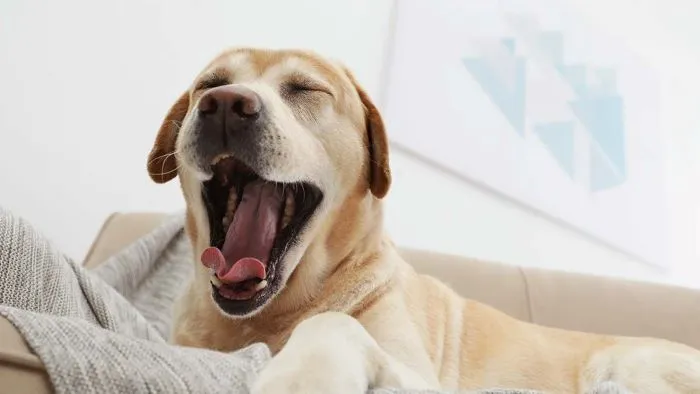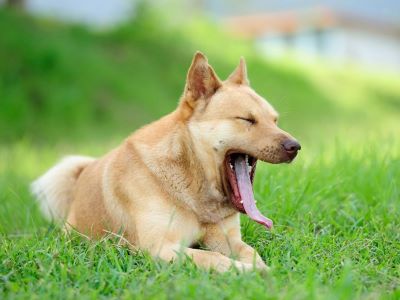We often yawn when we are tired, sleepy or due to a phenomenon called social mirroring. But, what about our four-legged friends? Have you wondered why dogs 🐶 yawn? What might be the reason for them to yawn? Are they tired, bored or just mimicking our behaviour?
There may be several reasons why your dog yawns. There are a few positive reasons, but some negatives ⛔ too may contribute. It is better to know the reason behind this behaviour of your Fido. Let us delve deeper and explore the yawning tales and the reason behind them. Why do dogs yawn?

Why Do Dogs Yawn?
Yawning is perfectly normal behaviour in dogs. You might have seen your dog yawning while settling for a nap. But yawning is not limited to their bedtime, then what might be the underlying cause for this behaviour? Well, if you think that dogs 🐶 just yawn out of boredom or stress then you need to hold back and explore some of the reasons why dogs yawn.
1) Stress
In most cases, stress in dogs becomes the main cause for them to yawn frequently. Dogs yawn as they feel anxious. Yawning is a signal that dogs use to calm themselves when they are stressed or uneasy. You might have noticed your dog yawning while entering a vet clinic or while approaching a stranger. These are signs that your dog is stressed or anxious.

According to Malcolm Weir and Lynn Buzhardt at VCA Hospitals, “If your dog is stressed, first remove him from the stressor. Find a quiet place for him to regroup. Resist the urge to overly comfort him. If you want to pamper him with petting or treats, make him earn them first by performing an activity.”
Some situations where a dog could be stressed are:
- Trembling
- Drooling
- Panting heavily
- Ears pinned back
- Changes in posture
- Avoidance behaviours
- Rapid eye blinking
- Rapid lip licking
- Following you more closely
2) Avoidance to Aggressor
Yawning can be a way for your dog to communicate with you or other dogs around. It can be a way to express that he is not interested in the situation. For instance, if a dog is showing signs of aggression like growling or barking, your dog 🐶 will simply yawn to avoid him.[1]
This behaviour is common in domestic as well as wild dogs. Often, dominant dogs and wolves when confronted with submissive or fearful pack members, will yawn to show their lack of concern with them. This seems to have a calming effect on the anxious dog.
3) Boredom
Just like we yawn when feeling bored, dogs too experience it. Often dogs get bored if they don’t get enough stimuli to keep them engaged. Some dogs are couch potatoes 😴 whereas others need a lot of play throughout the day. Well, this depends on the breed of your dog.
If your breed was originally bred as a wild or hunter then you need to provide enough attention and exercise to keep your dog mentally stimulated.
4) Mimicry
Mimicking yawn behaviour from others is often natural for us. This phenomenon of social mirroring is also common in dogs. However, it might vary from one dog 🐶 to another. It’s interesting to note that dogs tend to yawn when they see another dog yawning.

They also yawn when they see humans yawning, especially if it’s someone they know well. Some people believe that this behaviour highlights dogs’ capacity to empathize with both their kind and humans. So, the next time your dog yawns after you, it may indicate a strong bond 🤝!
Some signs that your dog is yawning out of joy:
- Tail wagging
- Play bow
- Rolling onto their backs
- Ears in a relaxed natural position
- Lying down with all four paws tucked underneath
A mimicked yawn is never a sign of stress, anxiety or boredom. It is a sign of bonding, empathy and trust. It is a good sign to have a dog 🐶 yawn while resting, playing or cuddling you. A happy and relaxed yawn is slow, with the mouth opening wide and the jaw slightly dropping.[2]
5) Medical Problems
Yawning can also indicate an underlying medical 🩺 issue in dogs related to teeth, gums or jaw pain. Your dog might have difficulty swallowing or an upset stomach. In some cases, yawning in dogs may indicate an ongoing issue affecting their throat/oesophagus region such as acid reflux, strictures or laryngeal paralysis.
Yawning could also indicate that your dog is in pain, suffering from a heart condition or struggling to get enough oxygen. It is important to diagnose the underlying cause if your dog is having a medical problem and treat it effectively.
What to Do If Your Dog Is Yawning a Lot?
Firstly, it is important to know the cause of why your dog yawns. If he is yawning due to fear or anxiety of being socialized, you should not force your dog to interact with others. Avoid situations that are stressful or that cause your dog to feel fearful like fireworks 🧨 or other loud noises 🎷.

If he is tired, you can simply comfort him in his bed. Create a safe space for your dog 😴 in a quiet room with soft background noise. Provide him with his special puzzles, treats 🍖 or toys 🧸 to keep him stimulated. Look for signs of odd behaviour in your dog. If it persists more than usual contact your vet 👩⚕️ to diagnose the underlying cause.
Signs that your dog is not well:
- Drooling
- Shaking
- Limping
- Nausea
- Excessive grooming
- Decreased appetite
- Showing teeth or growling
It is important to take care of your Fido and look up to his better health and happiness. Watch for these signs while yawning and ask your vet 👩⚕️ who will effectively cure the excessive yawning behaviour in your dog.
FAQs
Do dogs yawn when they are happy?
Your dog yawning could be a sign that they’re excited and trying to control their enthusiasm. A happy and relaxed yawn is slow, with the mouth opening wide and the jaw slightly dropping. This type of yawn will often be accompanied by circling or pacing with happiness.
Does a dog yawn always mean stress?
A yawn may indicate anxiety or stress. Your dog may yawn repeatedly while waiting in the vet’s office as a way of dealing with nervousness. However, yawning does not always mean that your dog is stressed. Sometimes, dogs also yawn to control their enthusiasm or just mimic our behaviour.
Is the dog yawning anxiety?
Dogs that are afraid or tense may whine or bark to get your attention or to self-soothe. Yawning, drooling, and licking are some common ways to get your attention. Dogs yawn when they are tired or bored, they also yawn when stressed. A stressful yawn is more prolonged and intense than a sleepy yawn.
How do I stop excessive yawning?
If your dog is yawning excessively, you should try adopting healthy sleep habits (if the yawning is due to a lack of sleep). Consult your vet and prescribe medication if the yawning is due to an underlying health issue or a sleep disorder.
Why Do Dogs Yawn? — An Overview
So, why do dogs yawn? Well, your dog can be stressed, tired, bored or simply mimicking your behaviour. He might also feel joyed or loved. Though yawning seems a natural canine behaviour, it can be a symptom of an underlying medical 🩺 problem. Thus, as a paw parent, you should look out for the cause as well as the frequency of your dog’s yawns.
If your dog is yawning excessively, consult a vet 👩⚕️ to diagnose the issue behind it. So, the next time they yawn, pay attention to their body language which might reveal something about their mood. You might also want to yawn back to show them that you care and understand them. 😉🐶
References:



